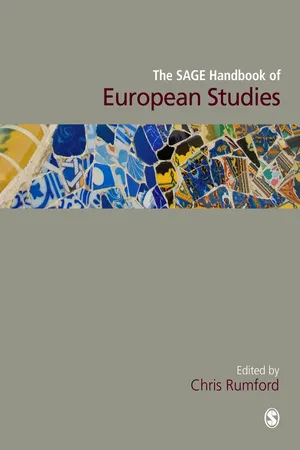
- 680 pages
- English
- PDF
- Available on iOS & Android
The SAGE Handbook of European Studies
About This Book
"This volume brings together some of the biggest names in European Studies to analyse the most important trajectories of Europe?s development and the challenges faced by the continent today. No one interested in Europe will be able to ignore this extraordinary collection of scholarship."
- Professor Thomas Diez, University of Birmingham "In its range and comprehensiveness it will be hard to beat; and it will certainly become an invaluable resource for sociologists, political scientists, historians and all others seeking the best information and most up-to-the-date approaches to the study of Europe today."
- Professor Krishan Kumar, University of Virginia "An impressive account of the state of the art of the study of contemporary Europe... This is an outstanding work and a definite companion to all those interested in contemporary Europe."
- Journal of Contemporary European Studies Europe is one of the world?s oldest civilizations. But what does it mean to be European today? What place does Europe have in global affairs? How should we analyze its key institutions, system of governance and broader cultural, social and political dynamics? This exhaustive and timely handbook:
- Explores the transformations that characterize contemporary Europe
- Investigates how we can best study Europe
- Consolidates European studies and provides a platform for future study
- Increases the profile of European studies.
The Handbookpromotes the increasing diversity of perspectives employed in the study of contemporary Europe and EU integration and is situated within the context of Europe?s transformations. It offers balanced coverage of political, social, economic, cultural and institutional dimensions of Europe, and includes chapters by leading authorities including Ulrich Beck, Craigh Calhoun, Donatella della Porta, Claus Offe, Anssi Paasi, Ben Rosamond, Gurminder Bhambra and Charles Tilly.
Multidisciplinary in organization, inclusive in coverage and cutting-edge in scope, The SAGE Handbook of European Studies is a landmark resource for anyone interested in Europe.
Frequently asked questions
Information
Table of contents
- Cover
- Contents
- Acknowledgements
- Contributors
- 1 Introduction: The Stuff of European Studies
- SECTION I - Contexts: History, Culture, Politics
- 2 Europe Transformed, 1945–2000
- 3 The European Heritage: History, Memory, and Time
- 4 Europe Beyond East and West
- 5 Postcolonial Europe, or Understanding Europe in Times of the Postcolonial
- SECTION II - Polity-Building: Institutionalization, Governance, Europeanization
- 6 Supranational Governance
- 7 National Interests
- 8 Markets
- 9 Law and Justice
- 10 Institutionalizing Democracy: Facing up to a Common Future
- 11 Competing Visions of European Union
- 12 Enlargement and the Meaning of Europe
- SECTION III - Themes and Issues
- 13 Uses and Abuses of the Concept of Integration
- 14 Economic Growth and Global Competitiveness: From Rome to Maastricht to Lisbon
- 15 Agricultural Policy and Protectionism
- 16 Europe and Global Governance
- 17 The Geopolitics of European Freedom and Security
- 18 Nationalism and Transnationalism
- 19 Migration, Minorities and Marginality: New Directions in Europe Migration Research
- 20 Citizenship, Democracy and the Public Sphere
- 21 Social Movements
- 22 Multiculturalism and Public Culture: A Historical Critique
- 23 Religion: Towards a Postsecular Europe?
- 24 Welfare State Formation in the Enlarged European Union: Patterns of Reform in Postcommunist States
- 25 Cities and Territorial Competitiveness
- 26 Regions and Regional Dynamics
- 27 Europe’s Borders
- 28 An Intellectual Homeland: Governing Mobilities and Space in European Education
- 29 Network Europe and the Information Society
- SECTION IV - Future Directions
- 30 The Contrasting Fortunes of European Studies and EU Studies: Grounds for Reconciliation?
- 31 Normative Power Europe: A Transdisciplinary Approach to European Studies
- 32 Europe as a Postemotional Idea – or, ‘Upon Us All There Still Lies “the Curse of Cromwell” ’
- 33 Understanding the Real Europe: A Cosmopolitan Vision
- 34 The Mountain Comes to Muhammad: Global Islam in Provincial Europe
- 35 Cosmopolitan Europe and European Studies
- Index